Our inaugural
Showcase Series featured five events spread across Asian Heritage Month, each celebrating the vast range of identities and experiences within Asian communities. Throughout the month, participants experienced musical performances featuring Chinese calligraphy, Japanese folk drumming, Malaysian choral music, and more!
Here, the participating artists from our "From the COC Community" event—Timothy Cheung (former COC Ensemble Studio), Saeideh Rajabzadeh (Community Partnerships & Programs), Keith Lam (Ticket Services) and Midori Marsh (COC Ensemble Studio)—share reflections on their experiences and relationships with their Asian identity and its intersections with music and opera. Read on to hear from the artists themselves!
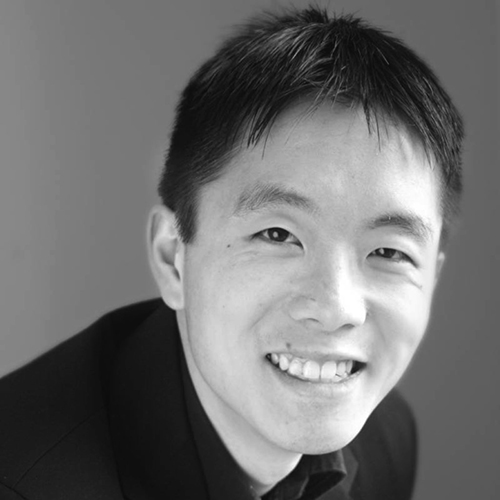 Timothy Cheung
Timothy CheungGreetings everyone, thank you so much for reading our stories. My name is Timothy Cheung, pianist and vocal coach (he/him). I was in the Ensemble Studio in 2011-2013 and am glad to be back to be a part of this Showcase Series concert.
May 19th, the date of this concert, is a special day for me because it’s the anniversary of my immigration from Hong Kong to Toronto. It was 1995 and I was 8 years old. My sister and I still text each other a Happy Canada Day on May 19 every year. For us, it’s a more poignant Canada Day than July 1st.
I am grateful that my family made the difficult decision and sacrifices to immigrate, and had the resources and privileges to do so. Our family was part of the first wave of mass immigration from Hong Kong in the 90s, because many were worried about the future of Hong Kong after the handover from British colonial rule to China. My family actually chose May 19th for a very specific reason. During the Tiananmen Square protests in 1989, May 19th was the last day of civil freedom for the protestors, before martial law was declared the next day.
I moved to a part of Toronto where many East Asians resided, and so I was fortunate in the sense that, as a child, I did not have to confront my racial identity as much as many others have had to. And I wish that kind of innocence were the case for children everywhere. Many of my friends had difficult experiences growing up.
As most immigrants know, racial identity can be a complicated issue. Many Hong Kongers are often in a balancing act—embracing our Chinese heritage, distancing ourselves from it, understanding what colonialism has done to, for, and against us, and imagining what the alternative would have been. How much should we be proud of, and how much should we assimilate? Lie low for safety, or stand up for our history? We have to take critical and realistic looks about our own values and beliefs. My own view of identity in general is that it is about your own set of priorities. We all choose how we identify, whether it is through race, gender, sexuality, career, family, hobbies, religion, personality—we consciously or subconsciously create an order of importance. Those priorities can change over time.
Contrary to that tired old East Asian stereotype, my family didn’t pressure me to become a lawyer or doctor. My mother owned a bar for 30 years, my father was a newspaper editor, my uncle is a film director. They were supportive, although realistically apprehensive, about my decision to become a musician. It was my own perception of that stereotype, surrounded by many talented Asian friends, that I exerted the most pressure on myself. Somewhat ironically, if my family didn’t make the decision to immigrate, I don’t think I would have a career in music at all, much less be working in opera.
I’ve done shows in seven different languages and vastly different styles. We talk a lot about their differences, all of which, of course, should be celebrated. There is one thing that remains constant no matter what languages and styles we perform in, and that is great singing—extraordinary technical abilities from hardworking singers, expressing themselves in the most genuine way.
The voice is the thing that drew me to opera in the first place. Everyone has a voice, physically and/or metaphorically. I remember the first time I heard one of my youth choir directors, a wonderful Taiwanese woman, perform an aria from Händel’s
Messiah. She rejoiced greatly, and I was amazed at how a person can produce such an impressive sound without a microphone, while singing so fast, and so beautifully.
While theatrical music exists in cultures all around the world, Western-style opera is a genre that originated in Europe, and we should not shy away from that history. It is an artform that has had the fortune and privilege of spreading to many parts of the world, and with that also comes the fortune and privilege of having discussions about inclusivity, programming, and casting. For me, it also comes back to the voice—by showing people how amazing singers can be, we can inspire young singers and draw in audiences from all different backgrounds.
As one of my mentors once said, tradition is not a matter of keeping things the same, but rather a way of connecting to our history as things change. So for me, heritage is about figuring out the positives of our culture—our food, our language, our art—as we move forward and interact with each other. It’s about sharing stories, and listening to voices. So, thank you for your support, for us and for opera.
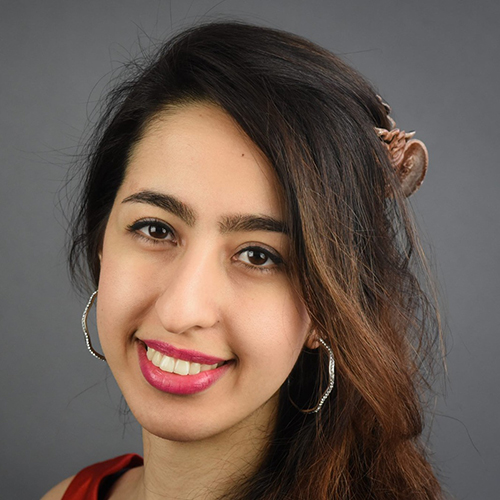
Saeideh Rajabzadeh
Hello everyone!
!سلام به همه
Throughout my story, I will be switching between English and Farsi as a way of acknowledging the Persian community that will be engaging with us through the Showcase Series.
On May 19, I performed the Persian artsong “Unattainable Love” or in Farsi, “عشق دست نیافتنی” from the song cycle Āshéghāné-Hā (Love Songs), which was a commission by the Canadian Art Song project, composed by the wonderful composer Dr. Afarin Mansouri. This song is part of a song cycle including 11 other Spritual love songs by 11 different mystical Iranian poets. The recording album will be published in fall 2022.
Dr. Mansouri is an award-winning composer and musicologist whose works have been performed around the world. She has collaborated with various organizations and opera houses. In her recent operatic work Forbidden, she introduced eastern musical idioms into this western genre of music. She has also written an opera in Farsi called Zuleykha. In 2016, Mansouri founded Cultureland, an organization to commission and produce operas that include non-western elements.
دکتر آفرین منصوری یکی از آهنگسازان و موسیقی شناسان ایرانی است که با سازمان های اپرای بسیاری همکاری داشته اند.آثار ایشان در کشورهای مختلفی اجرا شده است. خانم منصوری یک اپرای فارسی به نام «ذلیخا» نوشته اند
The artsong that I performed was set to the poetry of Hafez, which is drawn from one of his Ghazals or love poems. Hafez was a Persian poet from the 14th century whose poetry is studied every year at schools in Iran to this day. I myself grew up studying and memorizing many of his poetic works. This particular lyric poem recounts an unrequited love. Throughout the poetry, specific emotions are highlighted in the text.
[...My pain magnifies every moment…
….My desire grows every moment..
…My breath has sunken because of your love’s grief, yet you don’t admit it…]
مرا میبینی و هر دم زیادت میکنی دردم تو را میبینم و میلم زیادت میشود هر دم
…
فرو رفت از غم عشقت دمم دم میدهی تا کی دمار از من برآوردی نمیگویی برآوردم
My journey of coming to opera is not a usual story. I did not grow up learning music. I started taking piano, violin, setar, and voice lessons as a hobby back home when I was a teenager. My introduction to Western vocal arts was through Bach’s Canatats which I fell in love with. It was only after I started my singing education at the University of Ottawa that I fully grasped the scope and breadth of the existing operatic repertoire.
Back home it was difficult to find material relating to Western operatic music, so moving to Canada has allowed me to engage with this art in a deeper level and to fully pursue my love for opera. I was trained at the University of Ottawa in classical singing for 5 years and then completed my Masters in Musicology afterwards.
تحصیلات موسیقی خود را در دوره نوجوانی با کلاسهای پیانو ،ویولن، سه تار و آوازآغاز کردم و با مهاجرت به کانادا ، در مقطع لیسانس در رشته آواز کلاسیک و در مقطع فوق لیسانس در رشته موسیقی شناسی از دانشگاه اتاوا فارغ التحصیل شدم
Opera piqued my interest not just because of its bigger-than-life characters and emotions, but because I was in search of stories from my people and community within this genre. I felt quite alone as a female Persian classical singer in this field, but my adventure led me to explore never-performed-before music that connected me to my cultural heritage.
This exploration fed my passion for discovering works by living Persian composers and that is how I came to learn about Dr. Mansouri’s work. The artsong I performed on May 19 encapsulates my life as a classical singer and as a Persian artist which highlights not only my mother tongue, Farsi, but also the poetry that I grew up with.
.من به عنوان یک خواننده زن کلاسیک ایرانی در این زمینه احساس تنهایی میکردم، اما شور و اشتیاقم در مسیر موسیقی باعث آشنایی و کشف آثاری از آهنگسازان معاصر پارسی شد. بدین ترتیب با آثاردکترمنصوری آشنا شدم.
.به عنوان یک خواننده کلاسیک ، آهنگی را که اجرا کردم خلاصه ای از زندگی یک هنرمند ایرانی را به نمایش می گذارد.هنرمندی که نه تنها زبان مادری اش فارسی است بلکه با چنین اشعاری بزرگ شده است.
Keith Lam
My name is Keith Lam, my pronouns are he/him but you can use whatever pronoun as long as it’s respectful. Some of you just MIGHT recognize me if you’ve ever bought a ticket from the box office, well I work there. I’ve worked here at the box office for the past 14 years here at the Canadian Opera Company. I am also an occasional chorus member as well. I was born in Hong Kong and immigrated to Toronto at the age of 10. Throughout my childhood I had always been musical. I remember once I walked by a piano store, heard what was happening inside and thought, I want to be part of whatever that’s inside. Funny enough, my parents never discouraged me from wanting to pursue music. I was a different kind of a kid, maybe they saw that.
However, like many kids, I did start piano lessons as an introduction to the musical world. And throughout my teen years, I dabbled on many other instruments. I thought I was going to stick to the tenor sax but because there weren’t any one playing the baritone sax, I volunteered, maybe because I felt rather special to be the only one playing it in highschool. Even though I also participated in choirs and always loved singing, somehow I never thought about it as a career or thought it was a possibility. Music really gave me, this little queer kid, a way to escape; a way to express myself in a safe environment.
When it came time to apply to musical studies at an university, you have to pick an instrument to study. Piano, clarinet or sax, even though I’ve had some experience with all these instruments, none of them never really felt right. It wasn’t until one random day when my mother suggested vocal lessons (because one of her friends was taking them), I was properly introduced to classical singing.
I met my very first voice teacher Colin, he demonstrated something miraculous you can do with the human voice. He sang a note so resonating, it felt like it was still in the air after a second or two, like I could touch it. I was fascinated and I was hooked. After our very first lesson, I knew there and then, singing was my calling. To have complete control over something that belongs to me. We prepared as much as we can for my university auditions, and I ended up at a music program at Queen’s University. The faculty didn’t have an opera program but there was a student-run opera company which I auditioned for one year. It landed me my first operatic role, Dulcamara in Donizetti’s
The Elixir of Love (
L’Elisir d’amore). A role that was quite challenging for a first timer, a lot of patter singing and the requirement for some comedic timing. Having to stand on a big stage in front of a live audience, seeing and hearing them react to what I was doing was when I knew opera might be the direction I want to head towards. Many friends of mine chose the route to stay in school but after graduating, my instinct was guiding me towards a different path. Personally, the best way to learn stagecraft was to do it as much as I can. So I returned to Toronto, auditioned and put myself in as many show as I can.
Now I have to credit to my parents who never question my decision to pursue music. I mean, like most parents, they had been concerned about the financial side of things in earlier days but never tried to sway me away from a musical career. In my culture, one is often expected to be soft spoken, to blend in, never be too loud, don’t be so dramatic and choosing singing has always given me, for lack of better word, a voice. I feel seen and heard.
I thought I would be singing all your standard baritone roles but I discover I don’t have the big voices like the rest of my friends. They all got into the big schools or young artist programs but I simply didn’t. But that never ever deter me away from pursuing what my gut tells me; continue and you’ll find your space in this industry. Works of baroque and contemporary music soon fell on my lap and I’ve been incredibly fortunate to have worked with numerous music organizations such as Tafelmusik and Soundstreams. Hey I performed in Berlin and London last week singing Canadian contemporary music, not a bad way to make my European debut. I’ve always been a little different than what is standard/expected. Just like the aria I performed at the Showcase Series event, I’m going to live my fantasy and sing something I don’t normally get a chance—Wolfram’s aria from Wagner’s opera
Tannhäuser.
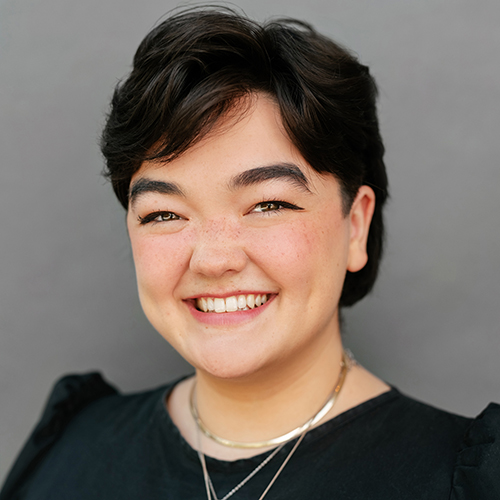
Midori Marsh
My grandmother Mitsuko Eto was born in the small agricultural town of Livingston, California, in 1923. Although she was born in America she spoke no English until she went to elementary school, where her frustrated teacher would lock her in a dark closet for not understanding what was happening in class. Her family picked grapes and worked labor jobs. She finished high school. After the bombing of pearl harbor, when President Roosevelt called for Japanese people on the western side of the United States to be interned, my grandma was able to exploit a loophole of sorts. She was accepted into an east coast university, and was able to move away to avoid being sent into the desert with the rest of her family. Alone, and on the way across the country, a police officer pulled her aside in a bus terminal, and questioned her. What was her name? Where was she going? Was she allowed to be here? He interrogated her for a long enough time that my notoriously organized and early grandmother missed her bus. She was not happy about this, and upbraided him so thoroughly for profiling her that he ended up apologizing, and buying her another ticket. I wonder about a lot of things. I wonder who my grandmother would have been if being Japanese was not a punishable offense during her formative years. If being Asian-American didn’t become an identity defined simply by a hated otherness. If she had been able to continue living on the west coast, close to the rest of her family. I wonder too, as anti-Asian hate crimes spike drastically in the US and Canada, if we can learn from our past mistakes. I’m sure we all have similar questions about our families, and what struggles, split-second decisions, and strife ultimately brought us into existence, years down the road. If my grandmother hadn’t moved across the country to avoid being interned, she wouldn’t have met my grandfather, my father would not have been born, he wouldn’t have met my mother when she came down from Ontario to Cleveland, Ohio to work at the hospital where eventually I was born. I wouldn’t be here, the person that I am, the artist that I was able to become, a woman named for my grandmother, Mitsuko, who was a chemist, a teacher, a cook, a fastidious neat freak, an activist. A Japanese-American woman. The songs I will be singing today are by Indigenous composer Ian Cusson, with text by Joy Kogawa, based on her childhood experiences of being interned during World War 2. I sing these songs for my grandmother, for my family, and for anyone else, Asian or not, who has had to fight for their right to exist, to move freely through the world, or even simply through the country they were born in. I encourage you all to take up space, demand what you are owed and build and support your communities, wherever life takes you. Think of a tiny Japanese woman, waif thin and barely scraping past the 5 foot mark, intimidating the intimidator, and take heart. These songs make me sad, but they are also a necessary reminder, a moment for reflection, and a call for more. ありがとうございます. Thank you.
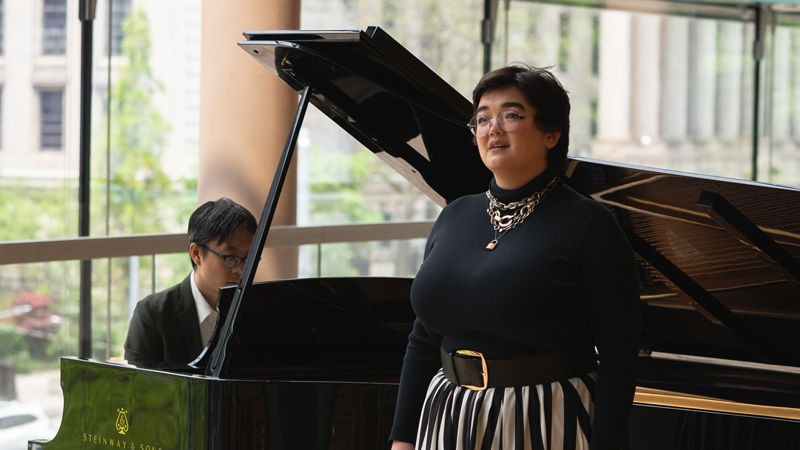


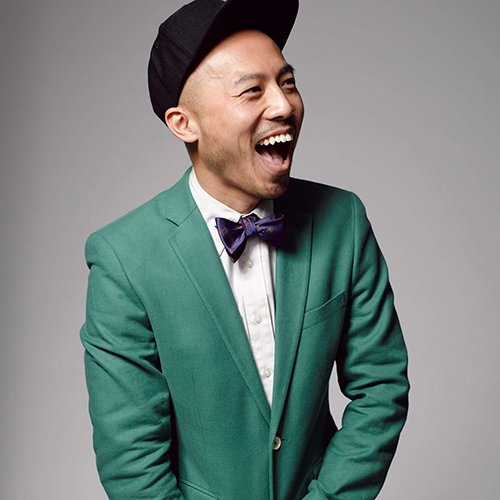 Keith Lam
Keith Lam Midori Marsh
Midori Marsh